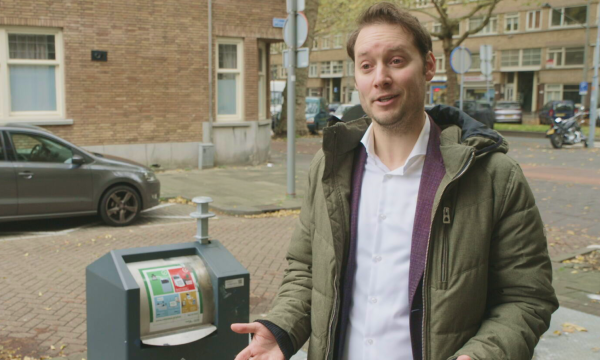It’s not just in our little Dutch country but worldwide, that people worry about the marketing of biodegradable products. A Danish crop advisor sued his competitor for bio advertising that he found to be misleading.
We grab the phone to contact Lars Steen Pedersen, director at Ellepot. His company advises growers on how to grow their crop more efficiently and environmentally friendly. With this last goal in mind, Ellepot experimented with plant pots made out of PLA (polylactid acid, a plant-based and biodegradable plastic, ed.) Obviously, Pedersen explains, it would be fantastic if this product would allow growers to leave their plant pots in the ground, where they would break down into water and carbon dioxide. Unfortunately, Pedersen found out, the pots did not degrade in the ground. Pedersen: ‘They only break down in an industrial composting installation.’
‘This would be a disaster’
It was to his great surprise, Pedersen tells us, that sometime later he saw his competitor advertise with pots of that same material, that were supposed to be ‘100% compostable’ and leave nothing ‘but water and air’ behind. He felt so wronged that he decided to go to court. Pedersen: ‘Clients will think that they can leave the pots in the ground, because they don’t know that they’re supposed to be sent to an industrial composting factory. They think the pot will break down and turn into compost in the ground. Wouldn’t that be a disaster for the environment?’
The court ruled in November. They agreed with Pedersen and forbade his competitor to use slogans like ‘leaves nothing behind’ and ‘100% biodegradable’. These would be misleading for customers. The competitor doesn’t agree with the court’s ruling and has appealed the decision.
Amazon
Pedersen came across more cases of misleading bio marketing. He forwards us the case of the State of California versus Amazon. Many Californians are prepared to pay more for products that are ‘biodegradable’. But what does biodegradable mean exactly? It can take hundreds of years before these products break down in a landfill. That’s why the Californian Public Resources Code prohibits the sale of products labeled as ‘biodegradable’. California’s prosecutors and Amazon reached a settlement. Amazon will no longer sell plastic products that claim to be biodegradable. ‘A strong example,’ Pedersen says.
Complaint Aldi
What’s the situation here in Holland? Has our own Dutch advertising watch dog, the Reclame Code Commissie (RCC), ever processed complaints about such marketing? Spokesperson Kirsten van Kleeff digs up a 2011-decision about a plastic bag from supermarket chain Aldi. The bag had a claim on it that said: ‘Let us introduce our environmentally friendly bag. This bag, made out of corn starch, will break down entirely into water and compost in the environment within 80 days and is just as strong as a normal carrier bag.’
A plastic technologist filed the complaint with the RCC: in his opinion the bag would only break down under specific circumstances. The RCC agreed with the complainant. According to the Dutch environmental advertising code (MRC) environmental claims may not contain information that might mislead the consumer with regard to the environmental aspects of the product that is being advertised.
On top of this, an environmental claim needs to be demonstrably correct and the advertiser is the one that has to be able to prove this. The ruling of the RCC says: ‘It is acknowledged that the statement that the carrier bag ‘will break down entirely into water and compost within 80 days’ is not correct.’ Aldi could not prove the opposite.
What about our 100% compostable coffee cups?
So what about our own coffee cups? These cups say they are ‘100% compostable’ even though we know they don’t break down in the woods and our waste disposer burns them. Is this a misleading claim? Unfortunately Van Kleeff cannot give us the answer right away: ‘If you want to know what the RCC’s opinion is about a certain claim, you will have to file a complaint first.’




